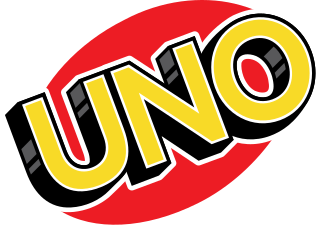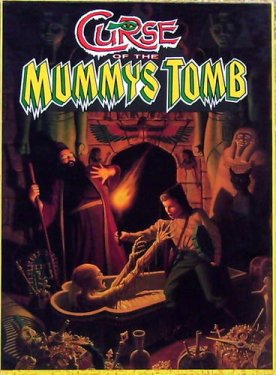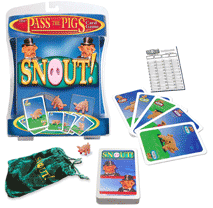
Craps is a dice game in which players bet on the outcomes of the roll of a pair of dice. Players can wager money against each other or against a bank. Because it requires little equipment, "street craps" can be played in informal settings. While shooting craps, players may use slang terminology to place bets and actions.
Catan: Cities & Knights, formerly The Cities and Knights of Catan is an expansion to the board game The Settlers of Catan for three to four players. It contains features taken from The Settlers of Catan, with emphasis on city development and the use of knights, which are used as a method of attacking other players as well as helping opponents defend Catan against a common foe. Cities & Knights can also be combined with the Catan: Seafarers expansion or with Catan: Traders & Barbarians scenarios.

Mahjong or mah-jongg is a tile-based game that was developed in the 19th century in China and has spread throughout the world since the early 20th century. It is played by four players. The game and its regional variants are widely played throughout East and Southeast Asia and have also become popular in Western countries. The game has also been adapted into a widespread online entertainment. Similar to the Western card game rummy, mahjong is a game of skill, strategy, and luck. To distinguish it from mahjong solitaire, it is sometimes referred to as mahjong rummy.

Games of patience, or (card) solitaires as they are usually called in North America, have their own 'language' of specialised terms such as "building down", "packing", "foundations", "talon" and "tableau". Once learnt they are helpful in describing, succinctly and accurately, how the games are played. Patience games are usually for a single player, although a small number have been designed for two and, in rare cases, three or even four players. They are games of skill or chance or a combination of the two. There are three classes of patience grouped by object.

Shithead is a card game, the object of which is to lose all of one's playing cards. The game became popular among backpackers in the late 20th century. Although the basic structure of the game generally remains constant, there are regional variations to the game's original rules.

Uno, stylized as UNO, is a proprietary American shedding-type card game originally developed in 1971 by Merle Robbins in Reading, Ohio, a suburb of Cincinnati, that housed International Games Inc., a gaming company acquired by Mattel on January 23, 1992.

Crazy Eights is a shedding-type card game for two to seven players and the best known American member of the Eights Group which also includes Pig and Spoons. The object of the game is to be the first player to discard all of their cards. The game is similar to Switch and Mau Mau.

Cheat is a card game where the players aim to get rid of all of their cards. It is a game of deception, with cards being played face-down and players being permitted to lie about the cards they have played. A challenge is usually made by players calling out the name of the game, and the loser of a challenge has to pick up every card played so far. Cheat is classed as a party game. As with many card games, cheat has an oral tradition and so people are taught the game under different names.

Mau-Mau is a card game for two to five players that is popular in Germany, Austria, South Tyrol, the United States, Brazil, Greece, Czech Republic, Slovakia and the Netherlands. Mau-Mau is a member of the larger Crazy Eights or shedding family, to which the proprietary card game Uno belongs. However, Mau-Mau is played with standard French or German-suited playing cards.

Rummy is a group of games notable for similar gameplay based on matching cards of the same rank or sequence and same suit. The basic goal in any form of rummy is to build melds which can be either sets or runs and either be first to go out or to amass more points than the opposition.

Greyhawk Wars is a fantasy board wargame that was published by TSR, Inc. in 1991. The game was designed by David Cook as a strategic simulation of the eponymous Greyhawk Wars on the fictional world of Oerth, the World of Greyhawk campaign setting for the Dungeons & Dragons role-playing game.
Switch, also called Two Four Jacks or Irish Switch, or Last Card in New Zealand, is a shedding-type card game for two or more players that is popular in the United Kingdom, Ireland and as alternative incarnations in other regions. The sole aim of Switch is to discard all of the cards in one's hand; the first player to play her, his, or their final card, and ergo have no cards left, wins the game. Switch is very similar to the games UNO, Flaps and Mau Mau, both belonging to the larger Crazy Eights or Shedding family of card games.

Curse of the Mummy's Tomb is a pulp fiction board game published by Games Workshop in 1988. It features a three-dimensional board, representing an Egyptian pyramid, with two consecutively smaller playing areas above the bottom board. The aim of the game is to reach the top of the Pyramid of Khonsu, complete the tasks within and obtain the Elixir of Life. In addition to traps, creatures and treasures, there can be encounters with the deadly Mummy itself.
A number of related games under the Yahtzee brand have been produced. They all commonly use dice as the primary tool for game play, but all differ generally. As Yahtzee itself has been sold since 1954, the variants released over the years are more recent in comparison, with the oldest one, Triple Yahtzee, developed in 1972, eighteen years after the introduction of the parent game.

Snout! is a variation on the classic dice game Pass the Pigs. Unlike the original, players earn points by discarding cards in their hand matching what was rolled and getting rid of all cards in their hand, rather than matching what they rolled to a point chart. It was published by Winning Moves Games USA in 2005 but is no longer in production.

Qwirkle is a tile-based game for two to four players, designed by Susan McKinley Ross and published by MindWare. Qwirkle shares some characteristics with the games Rummikub and Scrabble. It is distributed in Canada by game and puzzle company Outset Media. Qwirkle is considered by MindWare to be its most awarded game of all time. In 2011, Qwirkle won the Spiel des Jahres. A sequel, Qwirkle Cubes, was released by Mindware in 2009.
Irish Switch, also called Two-four Jacks, Lives or Black Jack, is a version of the card game Switch popular in Ireland. It is very similar to the original with a few rule changes. Switch is a shedding-type card game for two or more players that is popular in the United Kingdom, and as alternative incarnations in other regions. The sole aim of switch is to discard all of the cards in one's hand; the first player to play the final held card, and ergo have no cards left, wins the game. Switch is very similar to the games Uno and Mau Mau, both belonging to the larger Crazy Eights family of shedding games.

Shadow Hunters is a social deduction board game designed by Yasutaka Ikeda that was first published in 2005 by Game Republic in Japan. The game was published in the United States by Z-Man Games in 2008. The art style of the game closely resembles the style found in Japanese anime and manga.

Avalanche, also marketed as Lawine in the Netherlands, Avalancha in Spain, and Astroslide or Skill in Germany, is an abstract, mechanical strategy game published by Parker Brothers in 1966 that features colored marbles that roll down an inclined board.
Evolution: Random Mutations is a card game created by Dmitriy Knorre and Sergey Machin in 2010. The game is inspired by the evolutionary biology. It was published by SIA Rightgames RBG. Publishing of the game was financed in Boomstarter. English, French and German game editions were published in 2014.















